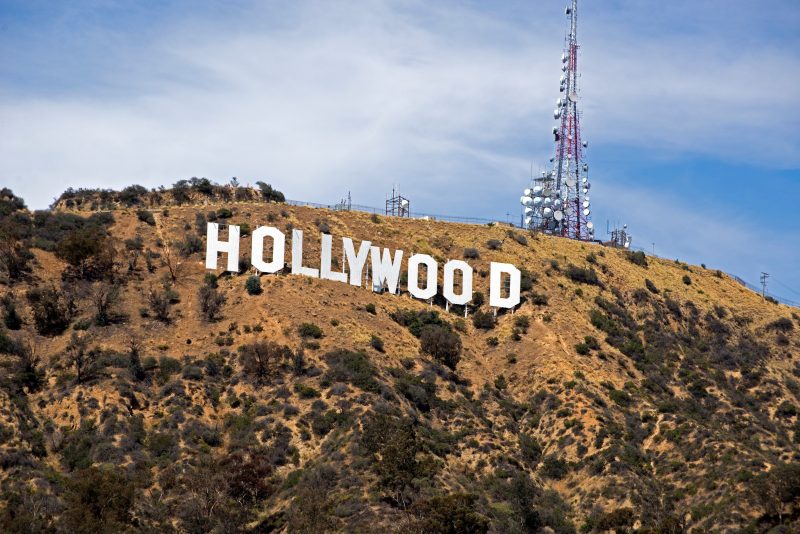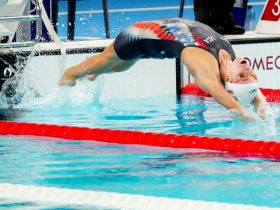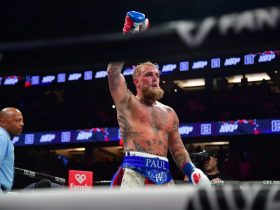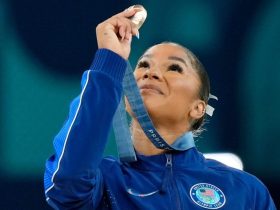PARIS – So, Los Angeles, how do you top that?
Now that the spectacular 2024 Summer Olympic Games have come to an end, the Olympic world turns its eyes to a very familiar host city for the 2028 Games, America’s Olympic city, Los Angeles.
LA will become the third city in the world to host three Olympics when the Summer Games come to Southern California from July 14 to July 30, 2028. The first time was in 1932 and the second was in 1984 when Los Angeles saved the day by hosting when no other city or nation wanted to, turning a huge profit that funneled millions into youth sports in the city and kicking off an era of tremendous Olympic success that has lasted 40 years.
So a city and a region with such a remarkable Olympic resume is hardly daunted by following the majestic visual feast that Paris presented to the world over the past 17 days.
“Our job is to be the most authentically spectacular Games for LA, not to try and out-Paris Paris in LA,” Casey Wasserman, president of the 2028 Los Angeles Olympic Organizing Committee, said in an interview here this week. “One of the reasons Paris has been so successful is they’ve been authentically French in every regard and that’s why it works. LA is a different city and so we have to be what you would expect and what you see and what people are used to seeing from big events in LA.”
In other words: Hollywood, the beaches, the ocean, the mountains, sunshine, celebrities, the works.
This conversation of “can you top this” has happened once before, with a sublime result for the subsequent Olympics. As soon as the 2008 Summer Olympics in Beijing ended, talk turned to London in 2012, and it went something like this: Poor London, how could it possibly follow the technical opulence and grandeur of a country like China that could put on the biggest show on earth with no concern for the guardrails of tight budgets, media scrutiny and, well, democracy.
“In the Beijing opening ceremony, there were, whatever, 10,000 people banging drums,” Wasserman said. “Then London does a great thing because it was authentically British, it had humor and fun and music and all this stuff and the Queen and Daniel Craig.
“Our job is not to compare but to be the best for LA. I think it’s important not to get caught up in that, the same way London frankly didn’t get caught up in that.”
One big change from Paris to LA will be a return to a stadium for the opening ceremony, which means the athletes of the world will receive the kind of raucous ovation in 2028 that was just not possible as they cruised the Seine River here.
Wasserman praised Paris’ incredible opening ceremony. “It was so spectacular,” he said. “I give them a ton of credit. … Beautiful idea.”
But it was missing something.
“The way I describe it is the one thing it missed was shared experiences,” Wasserman said. “So not just for the athletes, for the fans, you have the moment of, oh, Paul McCartney playing in London, everyone shared that moment at the same time, and here when it was coming down the river, you had your experience, but it was a very isolated experience for both the athletes and the fans. If you were on the river you saw what you saw but that’s all you saw.”
In that sense, for spectators gathered along the Seine that night, it was like watching a parade. The greatest parade ever, but still a parade.
“The energy that comes from a shared experience – Super Bowl halftime is the ultimate example, Super Bowl halftime being in the venue, everyone experiences it together,” he said. “I think that’s a really important thing to create that energy and I think it’s a really great opportunity for the athletes to feel that energy because it is the first night and that energy and that shared experience is pretty powerful.”
Olympic gold medalist Donna de Varona, a member of the U.S. Olympic & Paralympic Committee board of directors who also was on the LA Olympic bid committee, said it is vital to put the athletes first.
“We will put the athletes center stage,” she said in an interview here the other day. “We need to do that. I commend the French for going all out. It was a nice idea to use the Seine but the athletes were separate.
“I’m sure because all these stars came here it was really helpful on social media and it helps elevate the Games, but we still have to remember that the athletes are the stars of the show,” she said. “The athletes have to be the centerpiece and that’s the challenge of the countries marching in. There are all kinds of ways we can make that happen.
“Here, I think the only disappointment was that the athletes were not center stage in the opening ceremony. In LA, Hollywood will step up, but we don’t want Hollywood to overshadow the athletes. The athletes are the stars of the show.”
One athlete who was a star of the show here spoke enthusiastically about looking forward to a home game in LA in what would be her fifth Olympic Games. Katie Ledecky, the most decorated U.S. female Olympian ever, in any sport, was one of many athletes who appreciated the boisterous and delightful ovations every French athlete received here, win, lose, or draw.
“Seeing the kind of support that the French athletes are getting here, I think all of the U.S. athletes are thinking about how cool that could be in Los Angeles having the home crowd,” she said. “So that would be amazing to be able to compete there.”
When one Olympics ends, the promise of the next begins. Paris is done. On to LA.






